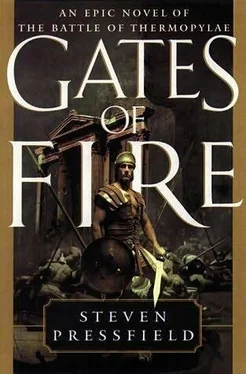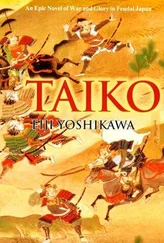Steven Pressfield - Gates of Fire - An Epic Novel of the Battle of Thermopylae
Здесь есть возможность читать онлайн «Steven Pressfield - Gates of Fire - An Epic Novel of the Battle of Thermopylae» весь текст электронной книги совершенно бесплатно (целиком полную версию без сокращений). В некоторых случаях можно слушать аудио, скачать через торрент в формате fb2 и присутствует краткое содержание. Жанр: Историческая проза, на английском языке. Описание произведения, (предисловие) а так же отзывы посетителей доступны на портале библиотеки ЛибКат.
- Название:Gates of Fire: An Epic Novel of the Battle of Thermopylae
- Автор:
- Жанр:
- Год:неизвестен
- ISBN:нет данных
- Рейтинг книги:3 / 5. Голосов: 1
-
Избранное:Добавить в избранное
- Отзывы:
-
Ваша оценка:
- 60
- 1
- 2
- 3
- 4
- 5
Gates of Fire: An Epic Novel of the Battle of Thermopylae: краткое содержание, описание и аннотация
Предлагаем к чтению аннотацию, описание, краткое содержание или предисловие (зависит от того, что написал сам автор книги «Gates of Fire: An Epic Novel of the Battle of Thermopylae»). Если вы не нашли необходимую информацию о книге — напишите в комментариях, мы постараемся отыскать её.
Gates of Fire: An Epic Novel of the Battle of Thermopylae — читать онлайн бесплатно полную книгу (весь текст) целиком
Ниже представлен текст книги, разбитый по страницам. Система сохранения места последней прочитанной страницы, позволяет с удобством читать онлайн бесплатно книгу «Gates of Fire: An Epic Novel of the Battle of Thermopylae», без необходимости каждый раз заново искать на чём Вы остановились. Поставьте закладку, и сможете в любой момент перейти на страницу, на которой закончили чтение.
Интервал:
Закладка:
Two puppies to be exact, runts of a disowned litter. Arkadian shepherd's hounds we had discovered shivering and suckling-blind, abandoned by their mother, who had untimely given birth in midwinter. We named one Happy and the other Lucky, and they were. By spring both had legs to run, and by summer their instincts had made them hunters. With those dogs our hungry days were over. We could track and kill anything that breathed. We could sleep with both eyes closed and know that nothing could take us unawares. We became such a proficient hunting team, Dio and I and the hounds, that we actually passed up opportunities, came upon game and let it go with the benevolence of gods. We feasted like lords and viewed the sweating valley farmers and plodding highland goatherds with contempt.
Bruxieus began to fear for us. We were growing wild. Cityless. In evenings past, Bruxieus had recited Homer and made it a game how many verses we could repeat without a slip. Now this exercise took on a deadly earnestness for him. He was failing, we all knew it. He would not be with us much longer. Everything he knew, he must pass on.
Homer was our school, the Iliad and Odyssey the texts of our curriculum. Over and over Bruxieus had us recite the verses upon Odysseus' return, when, clad in rags and unrecognizable as the rightly lord of Ithaka, the hero of Troy seeks shelter at the hut of Eumaeus, the swineherd.
Though Eumaeus has no idea that the traveler at his gate is his true king, and thinks him only another cityless beggar, yet out of respect to Zeus, who protects the wayfarer, he invites the wanderer kindly in and shares with him his humble fare.
This was humility, hospitality, graciousness toward the stranger; we must imbibe it, sink it deep within our bones. Bruxieus tutored us relentlessly in compassion, that virtue which he saw diminishing each day within our mountain-hardened hearts. We were made to recite the tent scene at the close of the Iliad, when Priam of Troy kneels before Achilles to kiss in supplication the hand of the man who has slain his sons, including the mightiest and dearest to him, Hektor, hero and protector of Ilium. Then Bruxieus grilled us upon it. What would we have done were we Achilles? Were we Priam? Was each man's action proper and pious in the eyes of the gods?
We must have a city, Bruxieus declared.
Without a city we were no better than the wild brutes we hunted and killed.
Athens,
There, Bruxieus insisted, was where Dio and I must go. The city of Athena was the only truly open city in Hellas, her freest and most civilized. The love of wisdom, philosophia, was esteemed in Athens beyond all other pursuits; the life of the mind was cultivated and honored, invigorated by a high culture of theater, music, poetry, architecture and the arts. Nor were the Athenians inferior to any city in Hellas in the practice of war.
The Athenians welcomed immigrants. A bright strong boy like me could take a trade, indenture himself in a shop. And Athens had a fleet. Even with my crippled hands I could pull an oar. With my skill with the bow I could become a toxotes, a marine archer, distinguish myself in war and exploit that service to advance my position.
Athens, too, was where Diomache must go. As a well-spoken freeborn, and with her blooming beauty, she could find service in a respected house and attract no shortage of admirers. She was at just the right age for a bride; it was far from a stretch to imagine her securing betrothal to a citizen. As the wife even of a metik, a resident alien, she could protect me, aid me in securing employment. And we would have each other.
As Bruxieus' strength diminished with the passing weeks, his conviction intensified that we follow his will in these matters. He made us swear that when his time came, we would go down from the hills and make for Attika, to the city of Athena. In October of that second year Dio and I hunted one long cold-coming day and kilted nothing. We tramped back into camp, grumbling at each other, anticipating a mean porridge of mixed pulse and mountain peas and, worse, the sight of Bruxieus, whose slackening constitution was each day becoming more painful to behold, maintaining that all was well with him; he did not need meat. We saw his smoke and watched the dogs bound up the hill as they loved to, sprinting to their friend to receive his hugs and homecoming roughhouse.
From the trail's turn below the camp we heard their barking. Not the usual squeals of play, but something keener, more insistent, Happy scrambled into view a hundred feet above us. Diomache looked at me and we both knew.
It took an hour to build Bruxieus' pyre. When his gaunt slave-branded body lay at last within the purifying flame, I lit a pitched arrow from the hollow above his heart and loosed it, flaming, with all my strength, arcing like a comet down the dark valley… then aged Nestor, peerless in wisdom among the flowing-haired Achaeans, laid himself down in the fullness of years and closed his eyes as if in sleep, slain by Artemis' gentle darts.
Ten dawns later Diomache and I stood at the Three-Cornered Way, on the frontier of Attika and Megara, where the Athens road breaks off to the east, the Sacred Road to Delphi and the west and the Corinthian southwest, to the Isthmus and the Peloponnese. No doubt we looked like the most savage pair of ragamuffins, barefoot, faces scorched by the sun, our long hair tied in horsetails behind us. Both of us carried daggers and bows, and the dogs loped beside us, as burrcoated and filthy as we were.
Traffic lumbered through the Three Corners, the predawn vehicles, freighters and produce waggons, firewood haulers, farm urchins on their way to market with their cheeses and eggs and sacks of onions, just as Dio and I had started out for Astakos that morning that seemed so long ago and yet was only two winters by the calendar. We halted at the crossroads and asked directions. Yes, a teamster pointed, Athens was that way, two hours, no more.
My cousin and I had barely spoken on the weeklong tramp down from the mountains. We were thinking of cities and what our new life would be like. I watched the other travelers when they passed on the highway, how they eyed her. The need was on her to be a woman. I want babies, she said out of the blue, the last day as we marched. I want a husband to care for and to care for me. I want a home. I don't care how humble, just someplace I can have a little garden, put flowers on the sill and make it pretty for my husband and our children. This was her way of being kind to me, of drawing a distance beforehand, so I would have time to absorb it. Can you understand, Xeo?
I understood. Which dog do you want?
Don't be cross with me. I'm only trying to tell you how things are, and how they must be.
We decided she would take Lucky, and I would keep Happy.
We can stay together in the city, she thought out loud as we walked. We'll tell the people we're brother and sister. But you must understand, Xeo, if I find a decent man, someone who will treat me with respect…
I understand. You can stop talking now.
Two days before, a gentlewoman of Athens had passed us on the highway, traveling by coach with her husband and a merry party of friends and servants. The lady had been taken by the sight of this wild girl, Diomache, and insisted upon having her sewing women bathe and oil her and dress her hair. She wanted to do mine too, but I wouldn't let them near me. Their whole party stopped by a shaded stream and entertained themselves with cakes and wine while the maids took Dio away and groomed her. When my cousin emerged, I didn't recognize her. The Athenian lady was beside herself with delight; she couldn't stop praising Dio's charms, nor anticipating the stir her blossoming beauty would create among the young bloods of the city. The lady insisted that Dio and I proceed straight to her husband's home the moment we arrived in Athens; she would look to our employment and the continuation of our schooling. Her manservant would await us at the Thriasian Gates. Just ask anyone. We tramped on, that last long day. On the freighters that passed now we could read the words Phaleron and Athens scrawled on the destination bands of serried wine jars and crated merchandise. Accents were becoming Attic. We stopped to watch a troop of Athenian cavalry, out on a lark. Four seamen marched past, heading for the city, each balancing his oar upon his shoulder and carrying his strap and cushion- That would be me before long.
Читать дальшеИнтервал:
Закладка:
Похожие книги на «Gates of Fire: An Epic Novel of the Battle of Thermopylae»
Представляем Вашему вниманию похожие книги на «Gates of Fire: An Epic Novel of the Battle of Thermopylae» списком для выбора. Мы отобрали схожую по названию и смыслу литературу в надежде предоставить читателям больше вариантов отыскать новые, интересные, ещё непрочитанные произведения.
Обсуждение, отзывы о книге «Gates of Fire: An Epic Novel of the Battle of Thermopylae» и просто собственные мнения читателей. Оставьте ваши комментарии, напишите, что Вы думаете о произведении, его смысле или главных героях. Укажите что конкретно понравилось, а что нет, и почему Вы так считаете.












